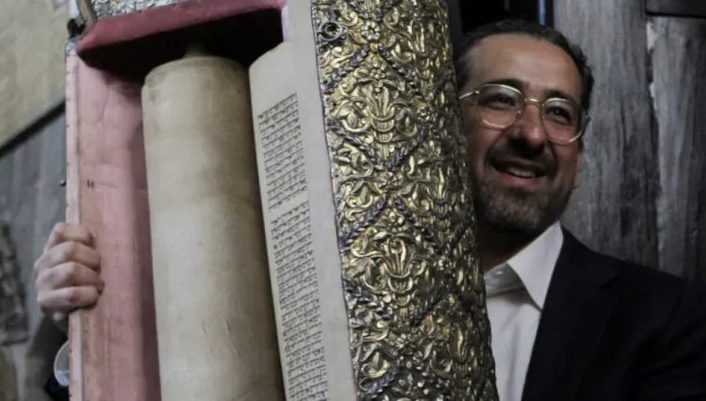There are times when we must be able to control our urge to criticize.
Miriam’s Love and Moshe’s Salvation
This week’s Parasha, BeHaalotecha, contains the strange story in which Miriam, sister of Moshe and Aharon, is punished for speaking Lashon HaRa (Evil Speech) about her brother Moshe. At first glance this is extremely difficult to comprehend. Miriam had nothing but love for her younger brother.
According to Chazal (our Rabbis) it was she who had urged her parents to reunite after they had separated, in despair of Pharaoh’s decree that all Jewish male babies should be killed. Miriam countered their pessimism by urging them to nevertheless strive to have children. That is our obligation, she reasoned, and if we merit the help of Hashem we will prevail.
Her prognosis was accurate. Amram and Yocheved were blessed with a beautiful baby boy. They sought to hide him as long as they could and when that was no longer possible, they placed him in a cradle in the bulrushes of the Nile. And then they waited, placing their trust in Divine Providence.
Our Emunah demands that we act to the best of our ability and then wait. We must wait and pray, because we can’t be so presumptuous as to seek to influence Hashem’s timetable. Savlanut (patience) in serving G-d is a necessary virtue.
The Hishtadlut (intercession) of the family, was rewarded as the compassionate daughter of Pharaoh, who had come to bathe in the Nile, spotted the cradle took pity on the crying baby, and rescued him from the water. Miriam had the presence of mind to arrange with Batya bat-Pharaoh for a Jewish woman to nurse the baby. And Moshe was thus nursed by his mother, Yocheved, until he was ready to be taken to the King’s Palace where he would be raised as a prince of Egypt.
It is ironic that Pharaoh who sought to destroy the redeemer of Israel wound up sustaining him in his early years. This may be seen as a fulfillment of the verse, “Many are the thoughts in the heart of man; but the plan of Hashem, that will triumph. (Mishlei 19:21)”
The Sin of Faulty Comparison
The special love and concern that Miriam had for Moshe is obvious from this story. Nowhere are we told that any rift had developed between them. So what is it that she said about her brother that was deemed to be so egregious?
The Pasukim (verses) state,
“Miriam and Aharon spoke against Moshe regarding the Cushite woman he had married; for he had married a Cushite woman. They said, ‘Was it only to Moshe that Hashem spoke? Did He not speak to us, as well? (BaMidbar 12:1-2)”
The Torah is extremely cryptic in recounting her “sinful speech”. It is not at all clear what the problem was, other than that it had something to do with the “Cushite woman he had married”.
The classic interpretation of Chazal, cited by Rashi (BaMidbar 12:1) is that they complained about the fact that Moshe had separated from his wife Tzipporah who bore him two sons, Gershon and Eliezer. It is natural that they assumed Moshe had done so because of his status as a prophet. They argued that they, who were also prophets, had not been obligated to abandon their spouses. Subsequently, they came to the conclusion that a prophet is not supposed to live in an unmarried state, and therefore asserted that Moshe was wrong in sending his wife away.
Moshe’s Unique Prophecy
One can readily see that this is not any type of slander or disparagement, which is normally the motivation of Lashon HaRa (Evil Speech). Miriam and Aharon had the greatest respect for Moshe, but believed he had erred in removing himself from Tzipporah. Nevertheless, their words received the harsh condemnation of Hashem. However, in responding to them, Hashem revealed fundamental ideas that were associated with the particular character of the prophecy of Moshe Rabbenu.
The Rambam (Hilchot Yesodei HaTorah 7:6) teaches that the prophecy of Moshe Rabbeinu was not merely superior in intensity or frequency, but was fundamentally different in kind. All other prophets received their visions while asleep or in a trance, through the medium of an angel, and conveyed in metaphors and riddles. Their encounters were accompanied by awe and trembling, requiring rigorous preparation and occurring only at times chosen by Hashem.
In contrast, Moshe Rabbeinu spoke with G-d while fully awake and alert. His prophecy was direct, unmediated by an angel, and entirely clear, completely free of allegory or obscurity. He remained calm and composed, able to receive prophecy at any moment, without fear or confusion. This unparalleled clarity and immediacy stemmed from the fact that Moshe was always spiritually prepared.
As the verse states, “You, stand here with Me” (Devarim 5:27), implying that Moshe alone remained in a constant prophetic state, never returning to ordinary human engagement. Consequently, he permanently separated from worldly matters, including marital life, “And he bound his mind to the Tzur Olamim, the Eternal Rock, and the glory never left him forever, and the flesh of his countenance shone, and he became holy like the angels.”
The special prophetic status of Moshe is of such a unique character that the Rambam counts belief in it as a separate fundamental principle of Judaism. This means that one is obligated to believe that Hashem endows certain people with prophecy, and, in addition, must believe in the sublime character of Nevuat Moshe (Prophecy of Moshe). We now understand why Moshe separated from his wife and the mother of his children, Tzipporah.
Now let us put ourselves in the position of Miriam and Aharon. They did not have access to the words of the Rambam and to all appearances it seemed that Moshe had acted on his own accord. Thus, from their standpoint, it seemed that Moshe may have gone beyond what was required, because there was no stipulation that prophets were to lead single lives. They were certainly sincere in their beliefs and had no intention to disparage their brother. If so, what was their sin?
The sin is communicated in very succinct terms by HaKadosh Baruch Hu (the Holy One Blessed is He), Who said, “Why did you not fear to speak about my servant, about Moshe? (BaMidbar 12:8)” It is true that Miriam and Aharon were concerned that Moshe had made a mistake, but they did not give adequate consideration to the vast difference between their prophetic level and his; and therefore the comparison that they made between him and them was faulty.
Did they believe that they were on the same level of prophecy as Moshe? It seems obvious that they did not, since it was Moshe that Hashem chose to speak to Pharaoh and to whom Hashem communicated both the Written and Oral Torahs. In my opinion, they clearly recognized Moshe’s superiority, but did not grasp the full extent of his uniqueness.
To put it in layman’s terms, they thought that Moshe was the number one prophet, but that they were basically all in the same ballpark, or that he was greater than they, in quantitative terms; but not that he was in an entirely different league.
However, given the reality of Moshe’s unique manifestation of prophecy, there was no basis for judging his actions by comparing them to their own. They should have been fearful of doing so, and this constituted their guilt. They should have considered that Moshe might be on a completely different level than themselves and refrained from making any judgements on the basis of comparisons. There are times when we must be able to control our urge to criticize.
Lessons in Restraining Judgment
As we have learned from the case of Nadav and Avihu, Hashem enacts judgements against those who are “closest to Him”, and thus, Miriam was visited with the classic punishment for Lashon HaRa (evil speech), Tzaraat (Divine blemish). This teaches us about the seriousness of the sin of Evil Speech. It has consequences even when one’s intention is not malicious, and is even motivated by a sincere belief that someone is doing the wrong thing. We must be very careful in rendering assessments based on unverified comparisons. This is especially so with regard to our great spiritual leaders, whose deeds may occasionally seem strange to us.
We may be tempted to criticize them by saying, “Well, other big Rabbis don’t do that, so why is he doing it?” We should rather be “fearful” of casting aspersions even on ordinary individuals, how much more so on people of great distinction? The closing prayer of the Amida-Shemona Esrei Prayer-is of great relevance. We say thrice daily, Elokai Netzor Leshoni MeiRa, “My G-d, guard my tongue from evil and my lips from deceitful speech. To those who curse me, let my soul be silent.”
We pray to Hashem that we should be weaned away from the inclination to utter evil speech, and that we may reach the level where what others may say of us, does not bother us; because our only concern is what the Creator of the Universe has to say about us.
May we merit to conduct ourselves in a manner that earns Hashem’s favorable judgment.
Shabbat Shalom.
Questions? Comments?
Please reach out to Rabbi Mann on WhatsApp at 050-709-2372 or by email at rebmann21@aol.com.
Alternatively, contact Mitch Rosner on WhatsApp at 054-426-3419 or by email at mitchrosner@gmail.com.
Dear Friends,
My newest book, Eternally Yours: Torah’s Enduring Relevance for a Life of Wisdom on Devarim, has been published and is now available at: https://amzn.to/3NBewg7. I hope that my essays will enhance your reading and study of the Book of Devarim and would greatly appreciate a brief review on Amazon.com.
For those in Eretz Yisrael, my books are available at David Linden’s Bookstore located at Emek Refaim Street 21, Jerusalem, and at Pomeranz Bookstore, Be’eri 5, Jerusalem. They are very nice stores to visit and browse.
Additionally, I have a new series of YouTube videos called “Rabbi Reuven Mann Torah Thoughts.” You can find them here: https://bit.ly/49N8hyX.





